Road Trip in Cilento – Vallo Di Diano and Alburni National Park with 7 Days Itinerary
The Starting Point, Marina di Ascea
After a few days by the seaside, we decided to begin our road trip to inner Cilento.
The weather turned more autumnal and with the sun losing its strength, it was great weather for hiking. The days became a bit cloudier, and the summer heat faded.
It’s the perfect time to explore the inland areas of Cilento.
We often spend our summer holiday in the Cilento Coast, so we’re familiar with the region. But there are still some places we haven’t visited yet. And many, that we wished to revisit.
This is the description of our 1 week itinerary of the best places in Cilento. Easily one of the most underrated areas of Italy.
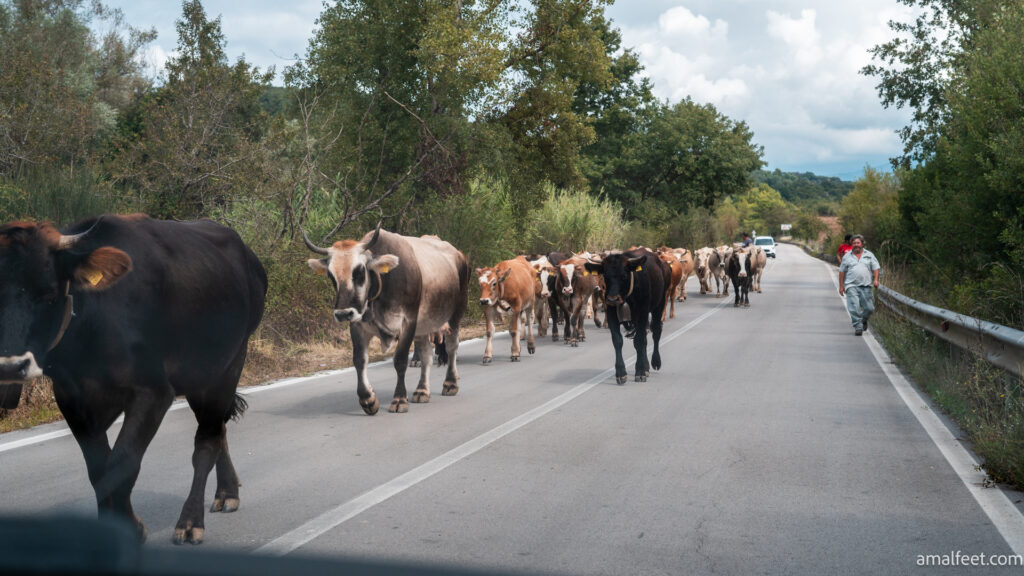
With an exceptionally beautiful coastline, and many natural wonders in its national park.
We rented a car directly in Marina di Ascea and planned to make a loop in a week.
Our 7 days itinerary includes some hidden gems. On this trip are rivers, waterfalls, abandon villages, caves, and 2 UNESCO World Heritage sites!
Tip:
You can rent a car in Salerno, to do a road trip around Cilento. But many seaside villages have smaller rental offices as well.
If you’re visiting during mild weather, spend a some nights on the coast, before going inland. The sea is usually swimmable from late April, till mid October.
Where to stay in the Coast of Cilento?
Agropoli, Ascea, and Sapri are accessible by direct train from Salerno and Napoli. And Marina di Camerota has frequent shuttle buses from the train station. But for exploring the inland areas, you’ll likely need a car.
If you have a car, you can stay in some of the more remote seaside villages too. The most charming towns by the sea are: Castelabate di Cilento, Acciaroli, Camerota and Palinuro. And of course, I must mention the little known Scario, as well.
Click here to find a great hotel on the Coast of Cilento.
Where to Stay in Marina di Ascea
We stayed in a four-star hotel just 200 meters from the sea. Hotel Porta-Rosa The hotel has its own lido (beach club), and sun loungers are included in the room price. It’s a small hotel with all the four-star amenities, including a decent swimming pool.
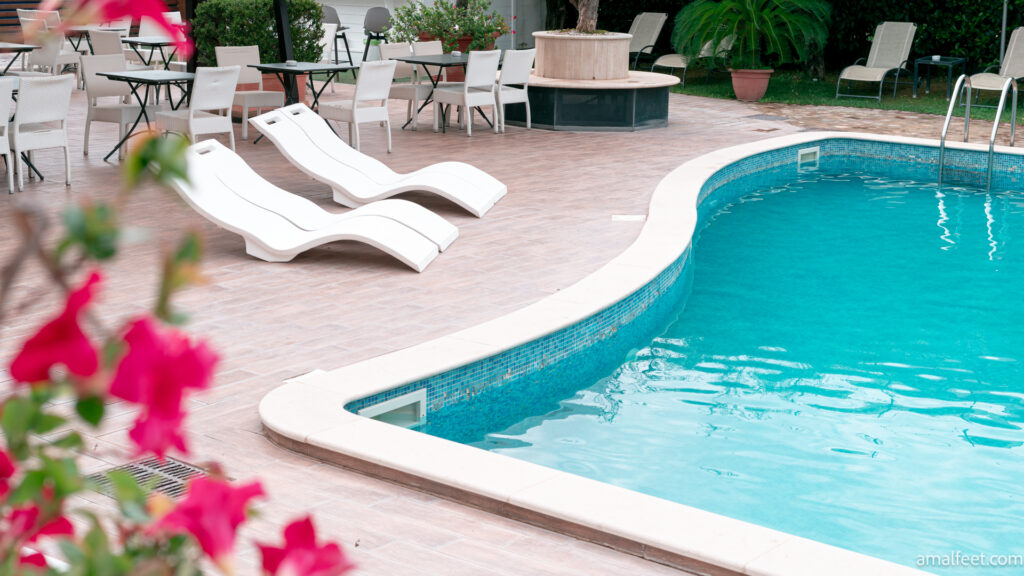
The First Day of the Road Trip – An Unusual Waterfall
The Vallo di Diano National Park has some fantastic spots to visit. We picked up the car in Ascea and decided to head toward the southern edge of Cilento.
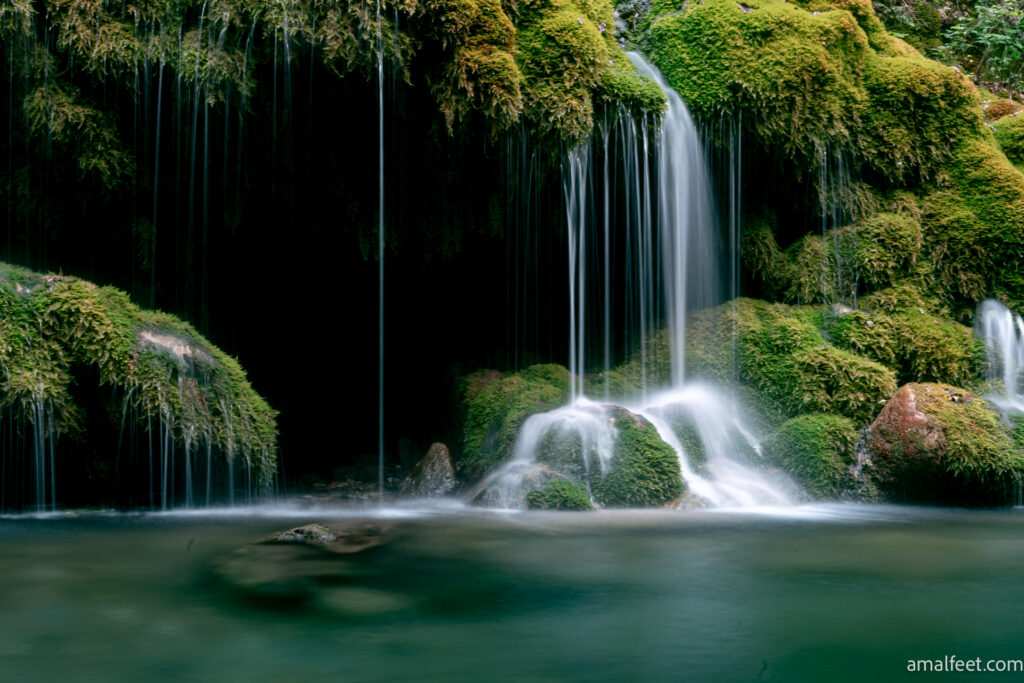
Capelli di Venere
The waterfall is called “Capelli di Venere,” which means “the hair of Venus” in English. It’s a waterfall with a delicate, ethereal appearance.
- Entry fee: €3, including parking.
- Accessibility: The waterfall is only a 2-minute walk from the parking area.
There’s also a trail above the waterfall, that you can follow for a longer hike. Across the road, you will find a man-made lake. This little lake has an incredible colour. Make sure not to miss it after you’ve seen the waterfall. Nearby the lake, you’ll also find a well-maintained picnic area. The place has plenty of tables and also restrooms.
To visit the Venus Hair Waterfall with a guide click here.
Other places to visit in the area:
- Morigerati, Oasi WWF. We arrived at the waterfall in the late afternoon, so we skipped this spot as I had visited a couple of years ago. If you have time, it’s definitely worth seeing.
How to get there:
- From anywhere along the Cilento Coast: take the “superstrada” towards Sapri. Then switch to the motorway SS517 to the direction of Buonabitacolo. The nearest exit for Capelli di Venere is Caselle in Pittari. From here the waterfall is signposted.
- From Salerno, take the Salerno-Reggio Calabria highway. In the direction of Reggio Calabria. This highway is often indicated on green signs as “SA-RC”. Drive for about 100 km, then take the exit at Buonabitacolo-Padula. Continue on the motorway towards Sapri. Take the exit at Caselle in Pittari. Look for signs for “Capelli di Venere” and/or “OASI WWF Morigerati. The drive from Salerno takes about 1.5 hours and covers roughly 120 km (about 70 miles)
Where to stay?
After our visit, we drove further inland, to get closer to Padula. And found a lovely farm stay last minute on booking.
Day 2- Planning Mistakes and Unexpected Road Closures
We woke up near Buonabitacolo and decided to explore the nearby mountain valley. In the afternoon, we planned to visit the Certosa di Padula, an UNESCO World Heritage Site.
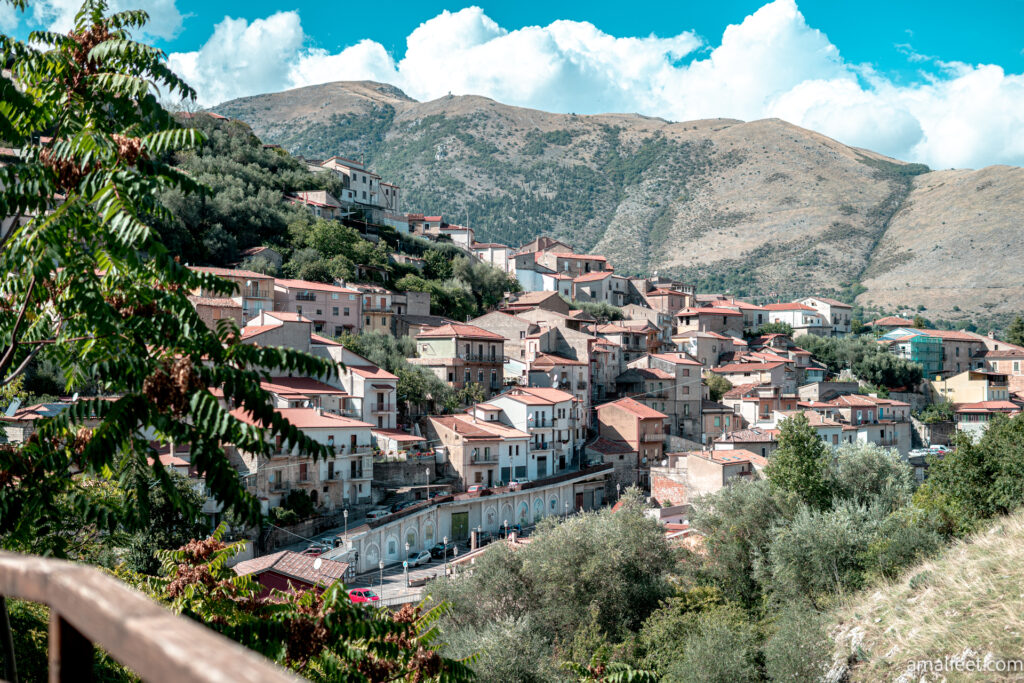
The Valley of the Orchids and the Small Town of Sassano
In Sassano we stop for a cappuccino before heading to the Orchid Valley.
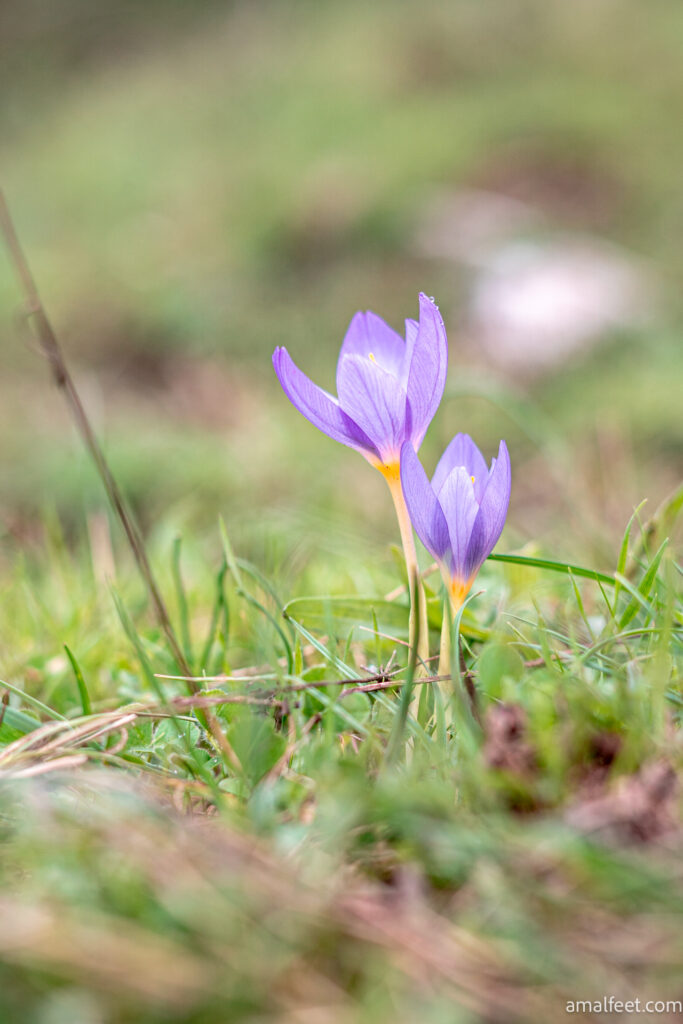
At the local bar, the lady informed us that there wasn’t much to see up in the mountains. Since the orchids are in bloom from February through early summer in the Valley of the Orchids.
At this time of the year (September) we are unlikely to see any. She tells as not to miss the ancient stone bridge on the way if we decided to continue into the valley, anyway.
The area is beautiful for hiking, with a few somehow-marked trails and panoramic views. So we don’t regret to stop by, even through no orchids were in sight.
The litlle town of Sassano itself, is also worth to walk around, with a charming historical center.
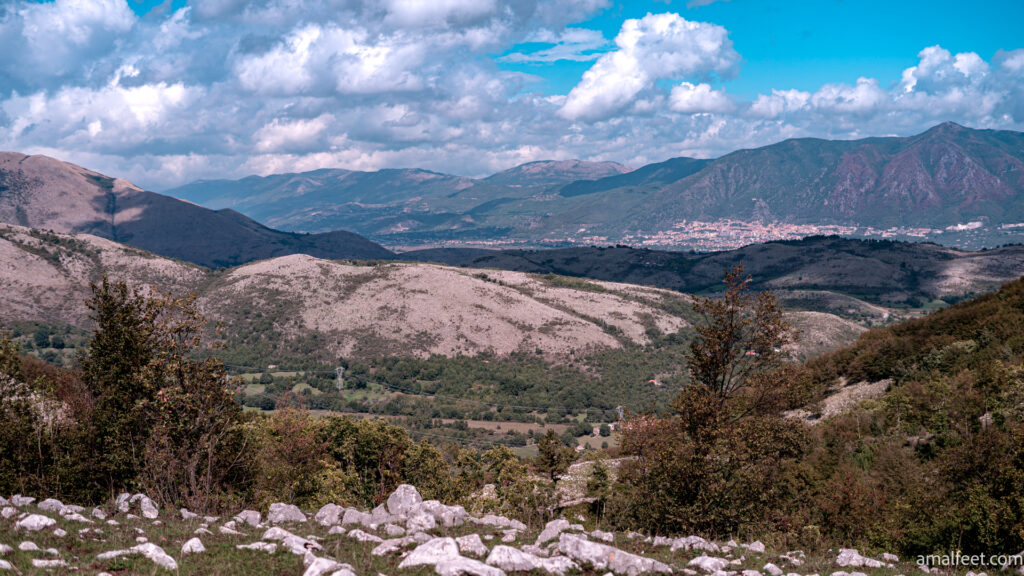
Change in Plans
After returning to the village, I checked the opening hours of the Certosa di Padula. And realised it that Tuesdays is the weekly closing day. An oversight on my part…
With the afternoon now free, we decide to move on to the next destination.
So I booked an agriturismo further up in Cilento to use as a base for the next 4 days. This way, we could visit the Sammaro Canyon and the abandoned village on our way. Or so I thought…
Gole del Sammaro and the Abandoned Village of Roscigno Vecchio
We took a mountain road from Sassano towards Sacco. This road is quite scenic, with plenty of winding serpentines. According to the map, everything seemed to line up perfectly.
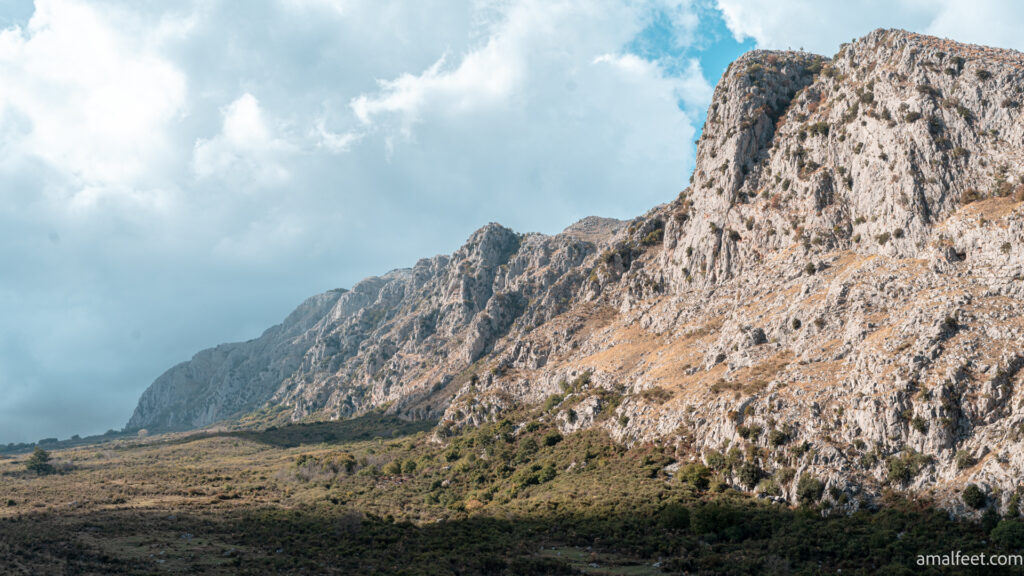
In reality, many mountain roads in Cilento are quite fragile. And prone to landslides during severe weather. The viaduct between Sacco and Roscigno was closed. While we managed to visit the Sammaro Canyon, we needed to skip the abbandon village of Roscigno Vecchio.
This also meant we had to take a much longer route to reach our booked accomodation.
Tip:
If you plan to visit Cilento, be aware that road closures can happen, especially in rural areas. Stay flexible with your timing and planning.
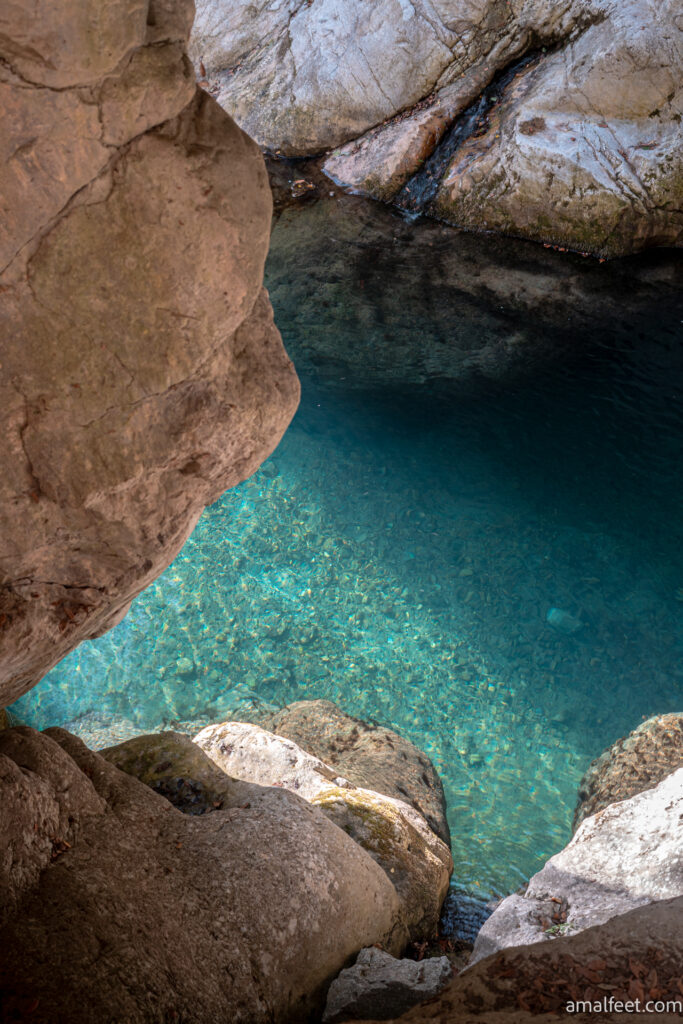
The Source of the River Sammaro and the Canyon
Just below the town of Sacco, a little rural road leads you close to the source of the River Sammaro.
From the last point accessible by car, it takes no more than 20 minutes to reach the entrance of the canyon.
It’s quite a spectacular place!
Felitto
Our route takes us not far from one of the most scenic spots in inner Cilento: Le Gole del Calore near Felitto.
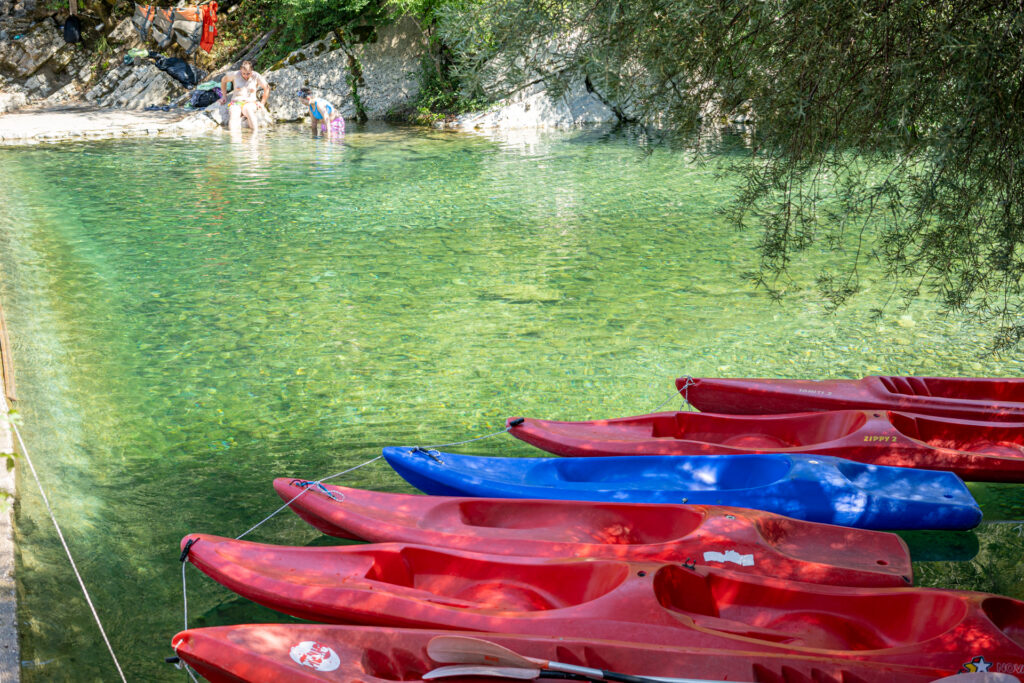
Make sure to add this place to your itinerary!
We visited it just a couple of months before this road trip during our summer holiday. In July, the water was very refreshing after the coastal heat. In autumn, it might be too cold for most of us to swim. But the area is still beautiful and worth visiting.
You can also rent kayaks to explore the canyon a bit more further up.
Day 3 – The Charterhouse of Padula
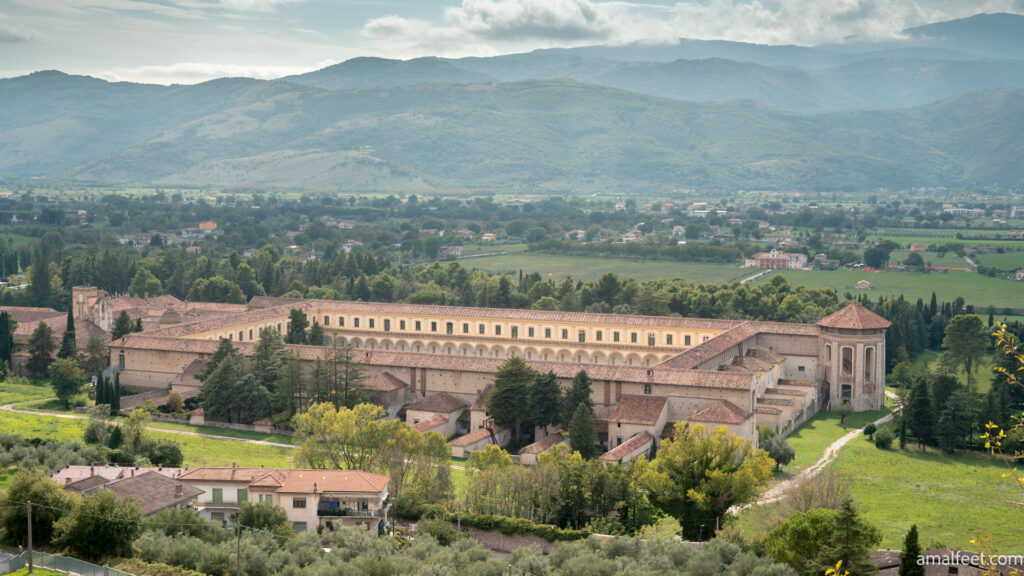
After my misplanning, we now have to drive back to Padula, which takes a while from our accommodation. But, the splendor of the Charterhouse definitely makes up for the long drive. It’s an UNESCO World Heritage Site for a reason. The complex is monumental, and the interior decorations are rich and lavish.
If you plan to visit, make sure to have at least 2 hours to dedicate for it. Even then, you might feel rushed!
Near the monastery, there’s a lesser-known site: the ruins of the old baptistery. If you can, stop by, before or after your visit to the Certosa.
There’s also a small picnic area in its garden. When we came here, there was nobody else around.
It is a bit of a walk from the Certosa parking area, so it’s best to have your own car or scooter to get here. The baptistery is well-marked from the road leading to the Certosa.
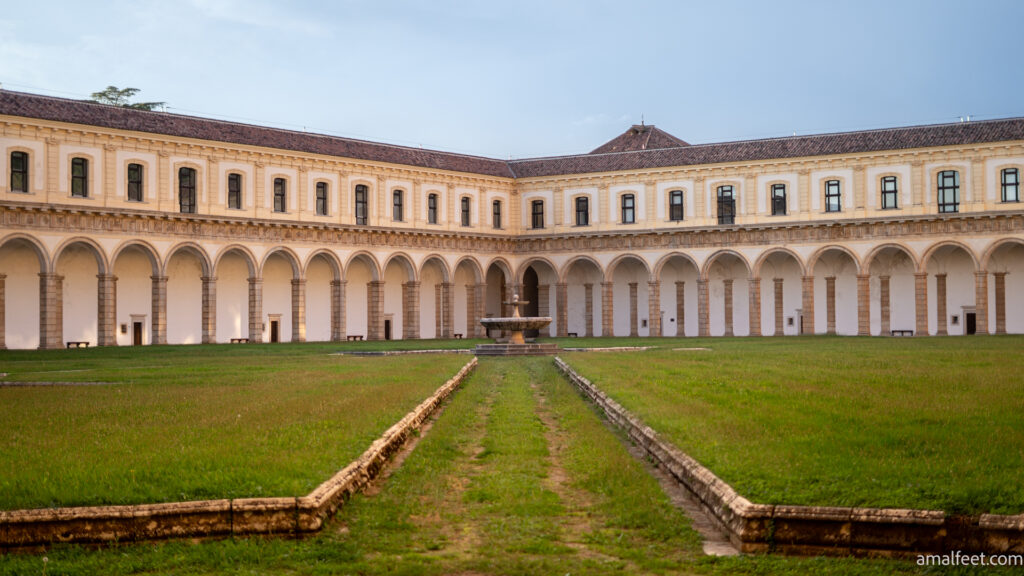
You can also visit the Certosa di Padula in a day trip from Salerno or Naples. Book your private tour here.
Day 4- Boat Ride in a Stalactite Cave
The Vallo di Diano National Park is home to 2 famous caves. Pertosa-Auletta and Castelcivita. This time, we opted to visit the Stalactite Caves of Pertosa-Auletta
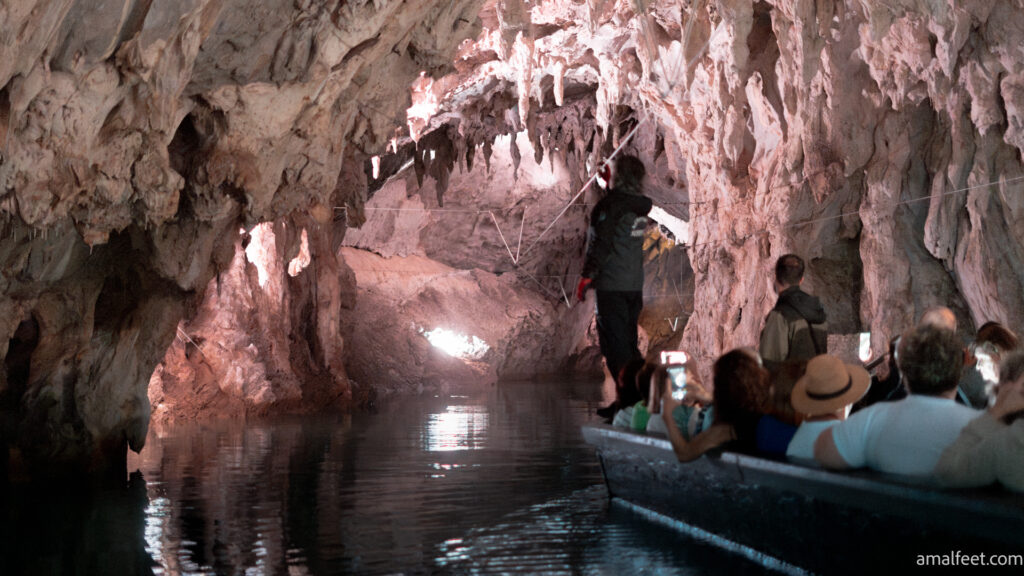
How to Visit The Caves of Pertosa
The cave is accessible only through guided tours. So you need to time your visit with the departure of the groups. Opening hours vary by season.
There is parking available near the entrance.
First, head to the ticket office, where you can buy your entry ticket and pay for parking. The lady at the ticket counter told us that the parking is valid for the entire day in the village of Pertosa too. So you can visit it later as well. There’s also a small museum there.
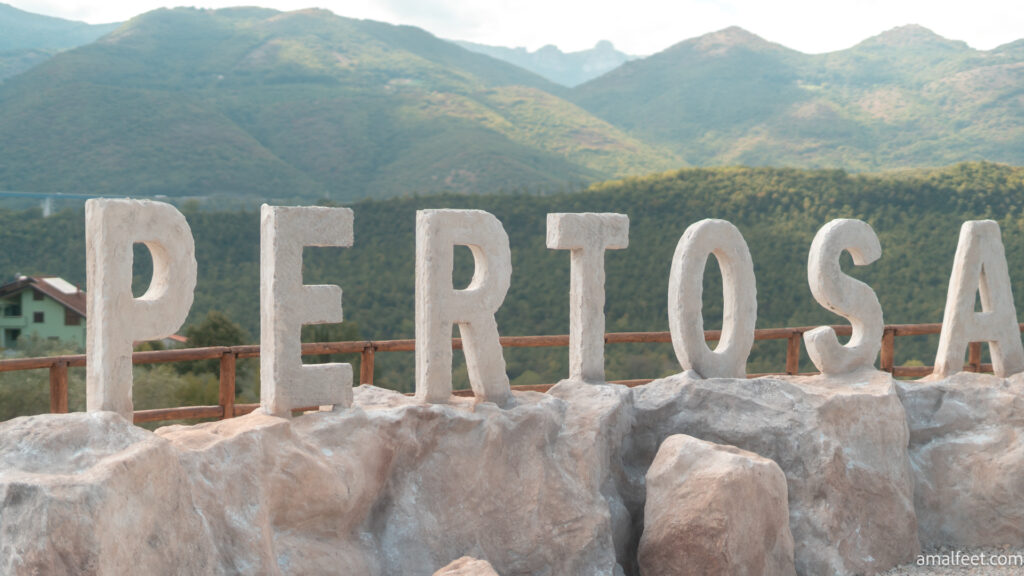
After getting your entry ticket, you’ll climb a couple of steps to the cave entrance. This is where the guided tour begins. The entrance to the cave is enormous. At the entrance, you’ll find a small model depicting a prehistoric village that once existed inside the cave.
From here, the first section of the tour is actually by boat.
After the short boat ride, the walking part of the cave tour begins. Our tour guide, Luca, was fantastic and informative, always ready to answer questions. Although the tour is in Italian, he spoke English and was happy to assist with any inquiries. For English speakers, audio guides are also available at the ticket office.
Tip: After your visit, stop by the little café called Speleo Bar. There are also interesting books about the area to check out there.
Not far away are other fantastic stalactite caves: The Caves of Castelcivita.
Day 5: A Secret Waterfall and Thermal Baths
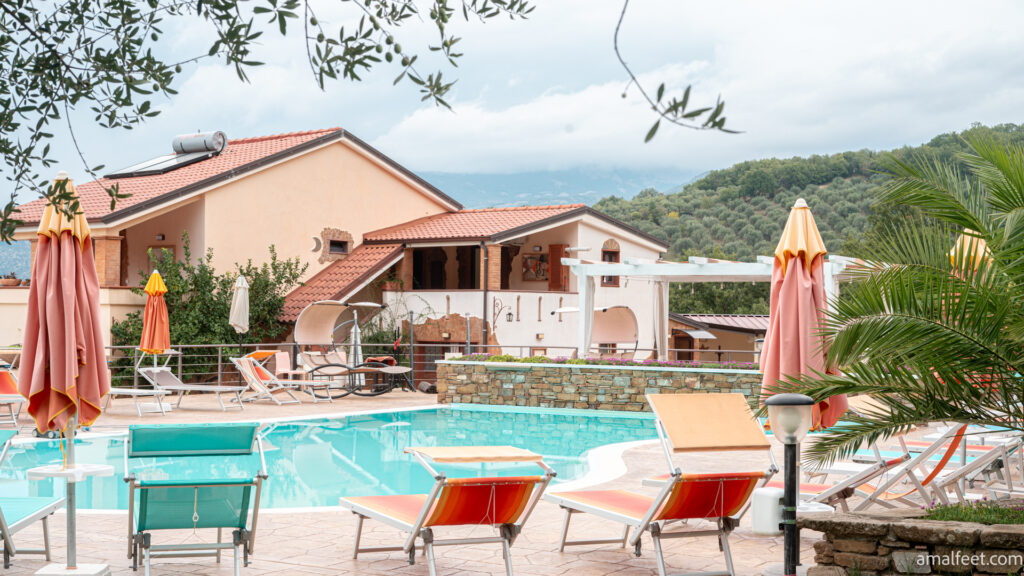
The Cave Church of San Michele
Our host at Agriturismo Masusa told us about a nearby waterfall. And suggested we visit the Cave Church of San Michele on the way. Although the church looked spectacular in the pictures, we found it closed. There were posted opening hours on the entrance. So we returned the following day at the indicated times, but sadly, the church was still closed. While there is a phone number to contact, we didn’t call it. As it would be difficult to plan around it in our spontaneous day trips. If you want to visit, it’s best to contact the municipality of Sant’Angelo a Fasanella beforehand.
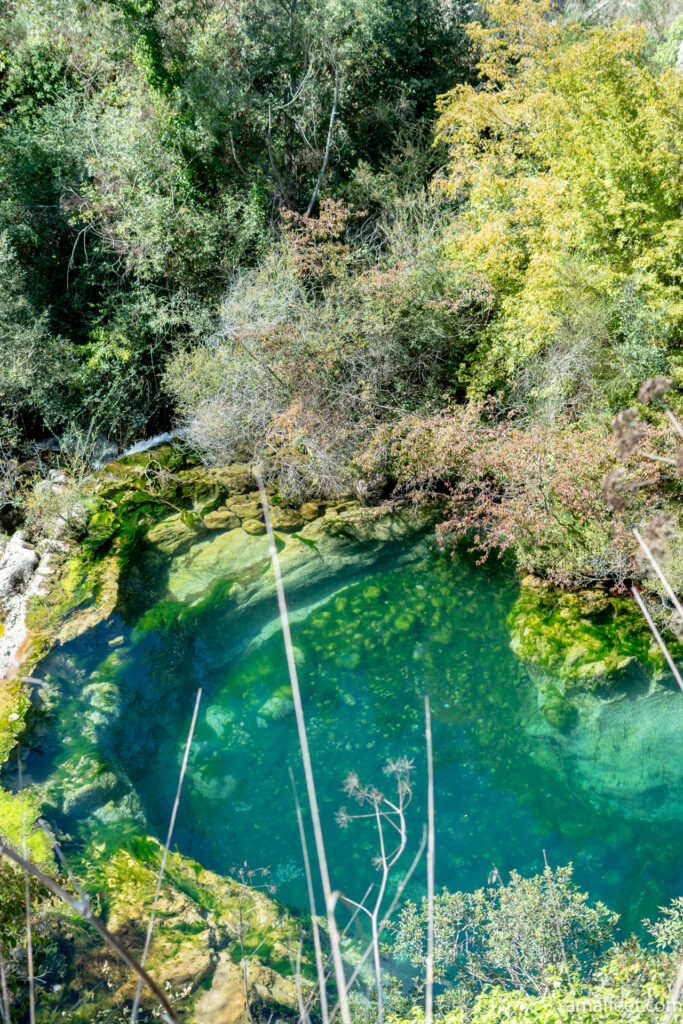
The Auso Waterfall
A little rural road with scarce indications leads you to the waterfalls. Not the waterfall itself, but the surroundings that make this place scenic.
An arched bridge from the Roman era spans over the river. The river has several natural pools that look very inviting. But the water is ice cold.
If you enjoy wild swimming, this is a must-visit spot in Cilento.
When the river in Felitto is busy with locals escaping the heat in August, I imagine, this place less crowded. As it’s quite bit off the beaten path.
After exploring the area, we decided to head to Contursi and relax in one of the famous thermal baths.
Contursi Terme
Technically, this is not part of Cilento, but it’s on its edge. It’s still in the province of Salerno, in the Sele Valley. And would make a great day trip if you’re staying in Salerno. This thermal area has a lingering sulfur smell that you can detect from miles away.
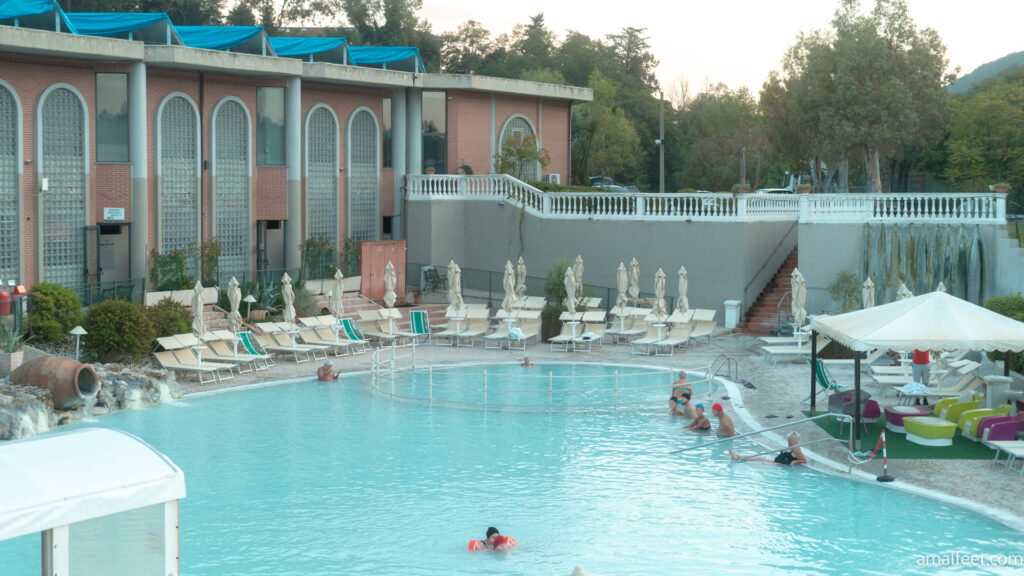
A couple of hotels have thermal pools, so you’ll need to choose which one to visit. My friend suggested we try either Terme Rosapepe or Terme di Capasso.
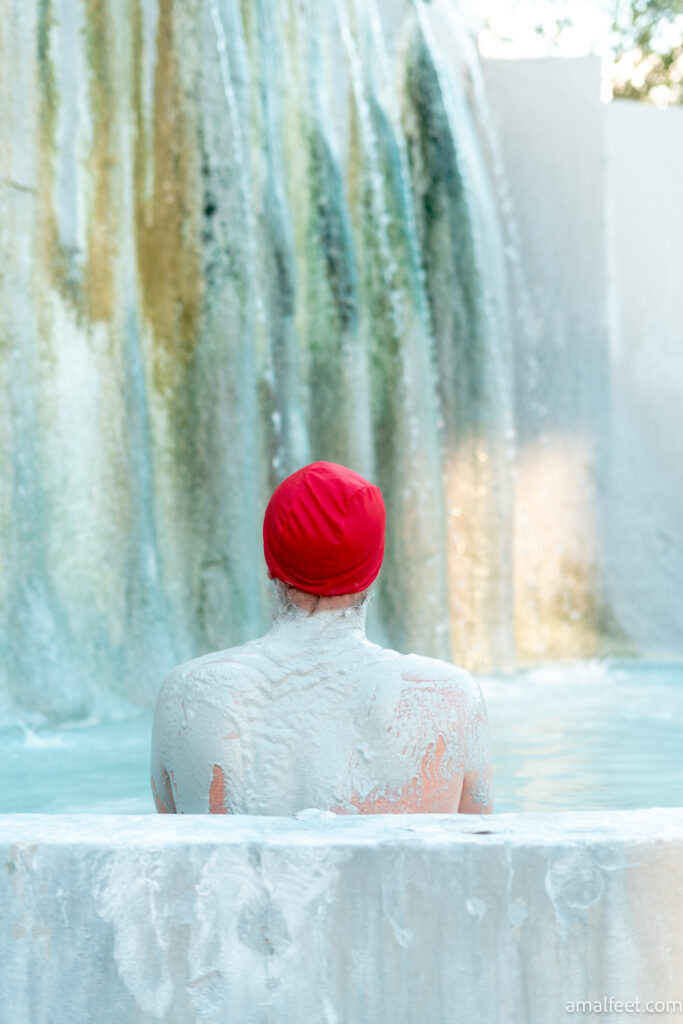
We opted for Terme di Capasso.
Entry fee: €15 on weekdays and €20 on weekends.
There is a main pool and several terraced pools, (which were unfortunately closed for maintenance on the day of our visit). There’s also a geyser and plenty of white mud for mud wraps.
It’s a four-star hotel, so you can stay here overnight and enjoy the thermal pools.
The thermal bath is open until late. And you can enjoy an aperitivo at the poolside bar or have dinner at the hotel’s restaurant.
Day 6: Back to the Coast and Another UNESCO Site
Our little farmstay was in the small village of Aquara, not far from the town of Roccadaspide. So, it was a perfect fit for our itinerary to stop by two of our favorite places. The Temples of Paestum and at the Vannulo Buffalo Farm.
If you don’t want to rent a car, but wish to visit Paestum and a Dairy farm, you can book a tour from Salerno or Napoli.
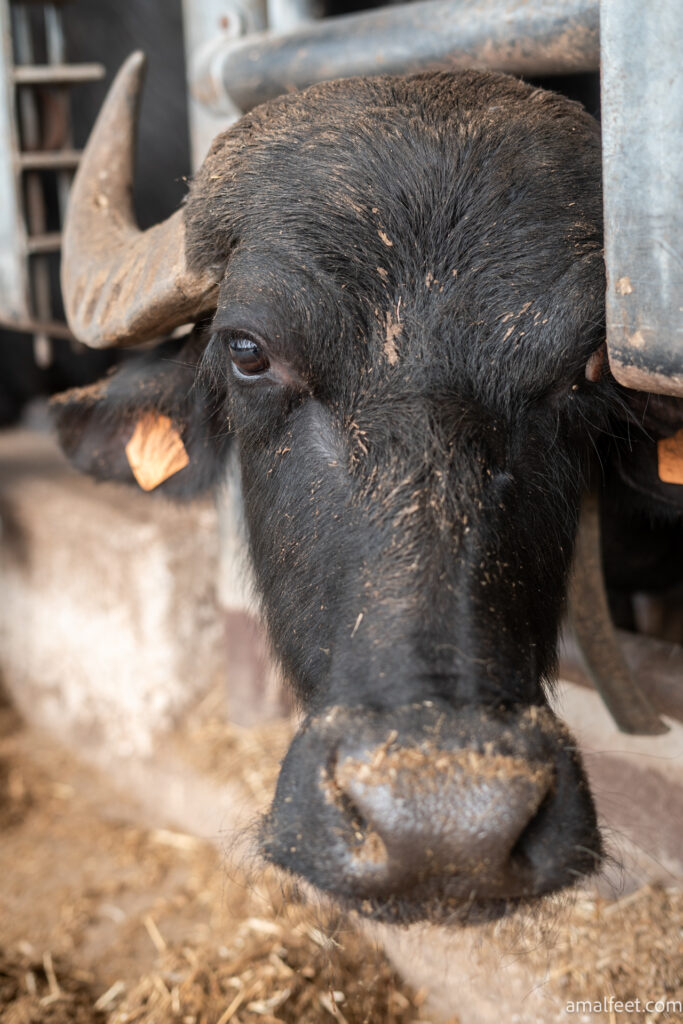
Paestum and the Mozzarella Farm
Whenever we’re in Cilento, we try to stop here on our way to the seaside.
Tenuta Vannulo is a must for at least an ice cream and a chance to say hi to the buffalos.
The ice cream is made from buffalo milk, and they also sell yogurt, as well as hazelnut and pistachio creams.
On-site, you’ll find a bar, a restaurant, and a bakery.
You can also try the mozzarella, but it’s usually only available in the morning.
The Archaeological Site of Paestum
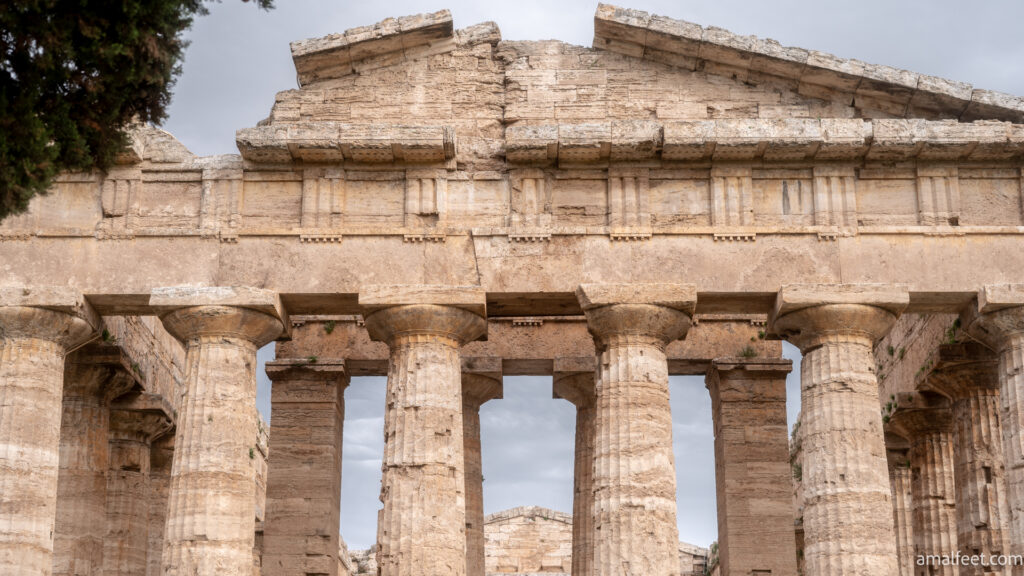
Some of the best-preserved Greek temples in the world are here in Paestum. The site is open-air and very pleasant to walk around and explore. There’s also a worthwhile museum nearby, included in the entry ticket.
Tip: If you’re following our itinerary, you might want to visit the scenic village of Trentinara. There is also a zipline here. The village is high up in a mountains top, with a panoramic square overlooking the coastal area.
Click here to book your small group tour with an archeologist to visit Paestum
You can also try a cooking class while in the area
Day 7: Back to Marina di Ascea to visit Velia

Visit to the Archaeological Site of Velia
On our last day of this road trip around Cilento, we return to our starting point, Marina di Ascea.
In the early morning, we head to the Archaeological Site of Velia. This site is included in the ticket for the archaeological site of Paestum, so the same ticket is valid here. To visit the acropolis, where the watchtower and the ruins of the theater are, you must walk up the hill. The most important monument at the site is the ancient arched door, Porta Rosa.
To explore and visit the area, you’ll need at least two hours.
The view from the tower is fantastic. You can see the sea, the open fields and hills and the Mount Stella towering over the seaside. In the background, you can also see the high mountains of inner Cilento. With the characteristic silhouette of Mount Gelbison in between them.
If you would like to visit Velia with guide click here
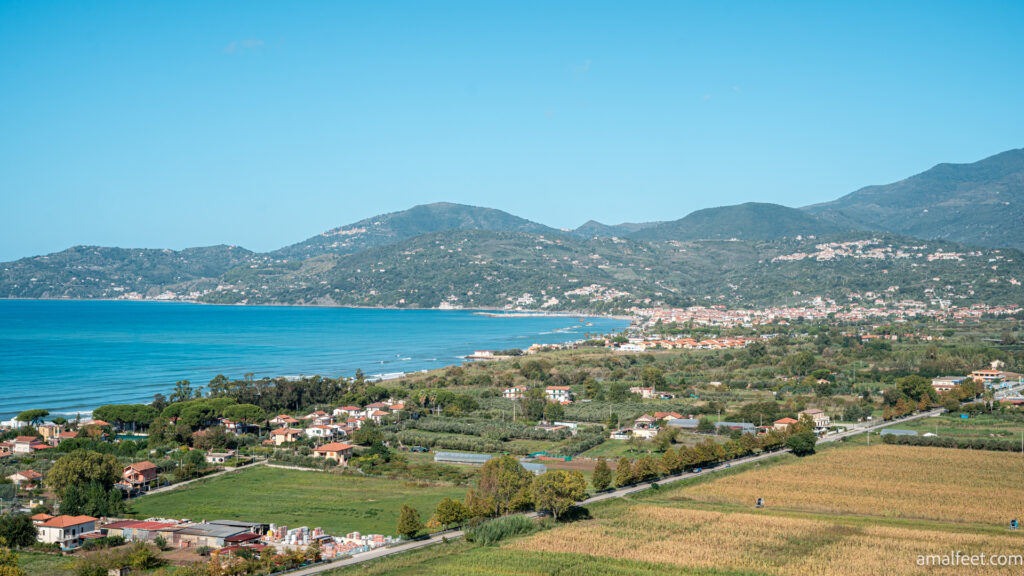
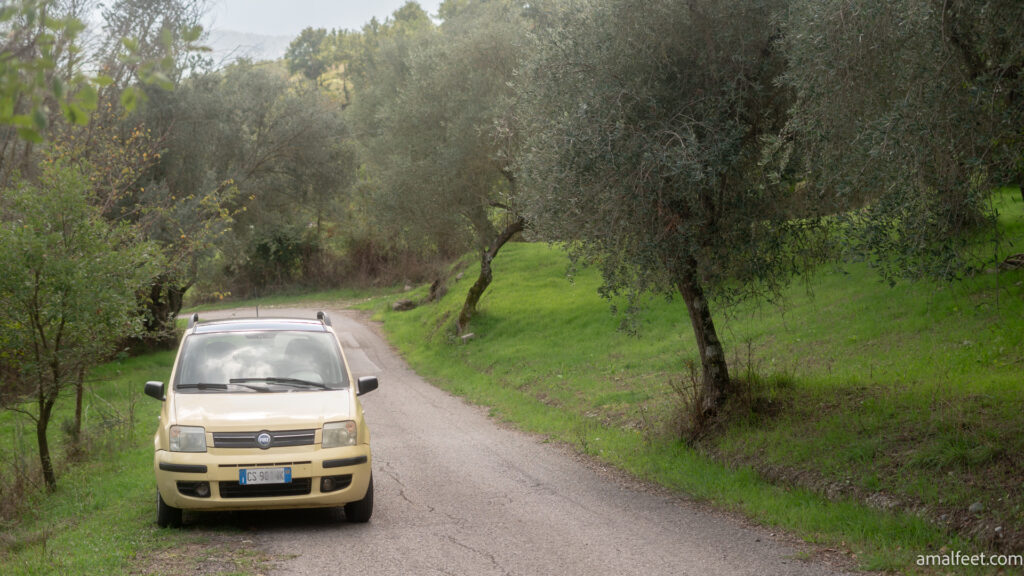
We rented our car in Marina di Ascea, at the local car rental.
If you prefer to rent a car in Salerno or Napoli, click here.
You can find more info on Cilento here.
This post contains affiliate links.
Follow me on Instagram for more pics a and travel tips!
